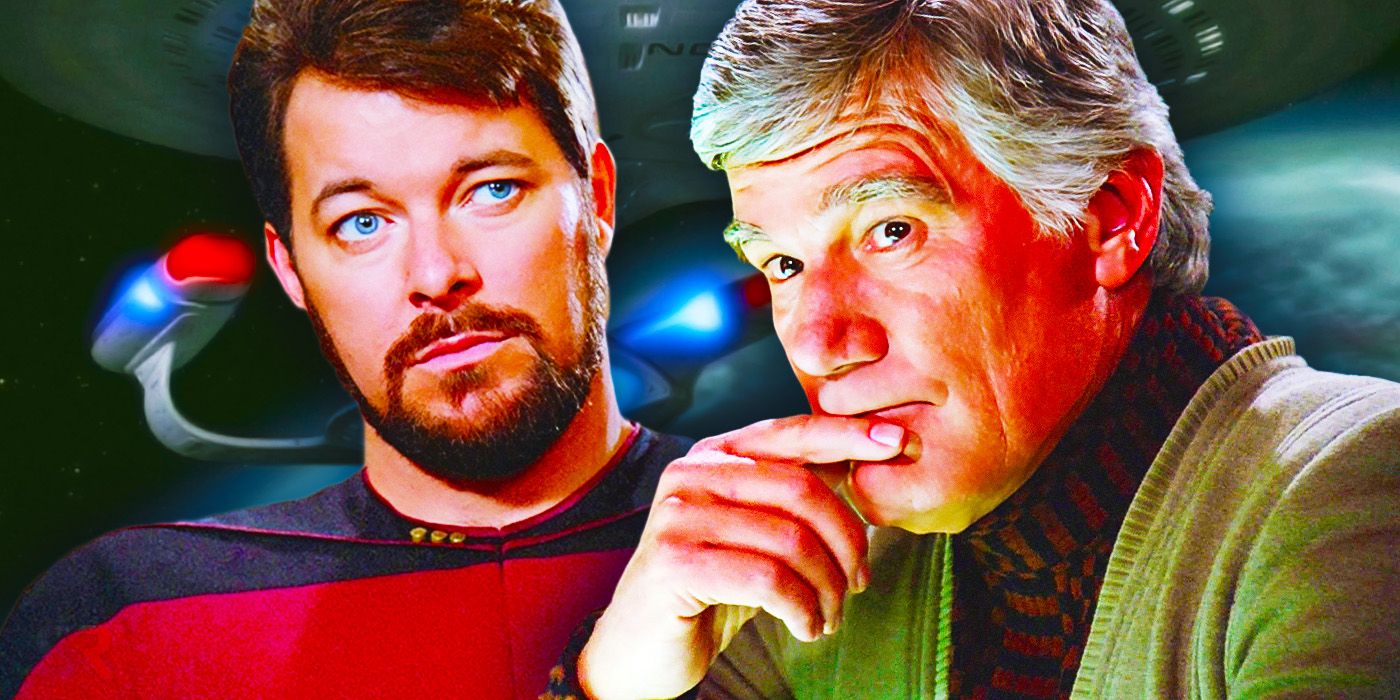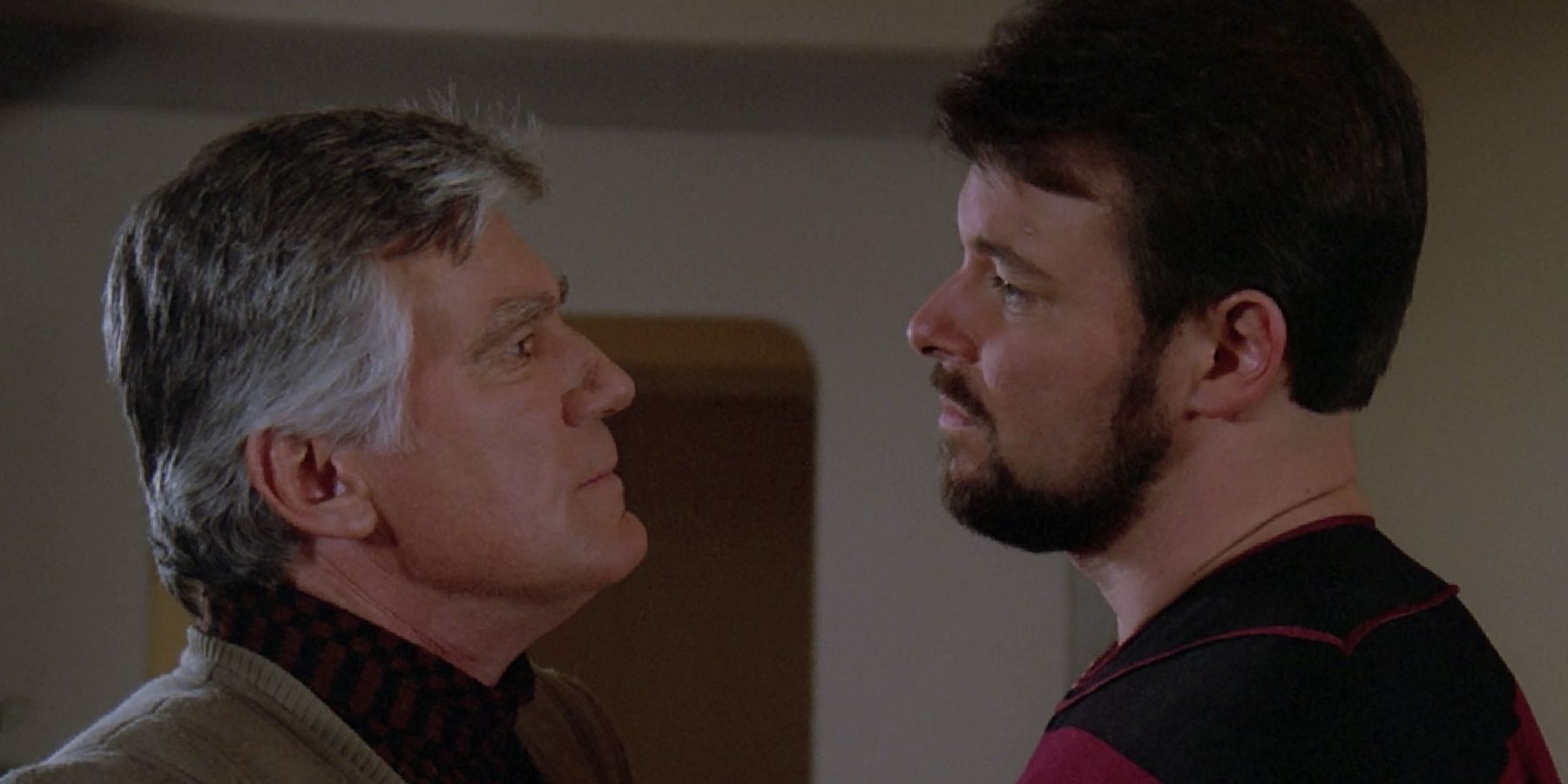Roddenberry’s “no conflict” rule prevented Star Trek: The Next Generation from fully exploring Will Riker’s complicated relationship with his father.

Summary
- Rule against conflict in TNG made Riker father-son reunion fall flat.
- Director wanted more emotion in Riker father-son story but was overruled.
- Conflict between Riker and his father resolved too quickly, lacking depth.
Commander William Riker (Jonathan Frakes) reunites with his father, Kyle Riker (Mitchell Ryan), in Star Trek: The Next Generation, but Gene Roddenberry’s insistence on avoiding conflict made the episode fall flat. When creating TNG, Roddenberry implemented a “rule” that there would be no conflict among the show’s main characters, implying that they would have moved past that by the 24th century. Many of TNG’s writers struggled to adapt to this rule, as it made crafting dramatic and interesting stories more difficult. Conflict is a major part of storytelling, after all, and it does not always come from an outside source.
Roddenberry’s infamous rule becomes particularly apparent in Star Trek: The Next Generation season 2, episode 14, “The Icarus Factor,” in the relationship between Will Riker and his father. When Commander Riker gets offered his own command of the USS Aries, his father, Kyle, shows up to brief him on his new and potentially dangerous mission. Will Riker’s mother passed away when he was only two years old, and Kyle raised his son alone until he abandoned Will when the boy was fifteen. While it’s clear early on that Will wants nothing to do with his father, neither man shows much emotion, despite the fact that they have not spoken in fifteen years.
Roddenberry Overruled Adding More Emotion To Star Trek: TNG’s Riker Father & Son Story
The confrontation between Will and his father falls flat.
According to Captains’ Logs: The Unauthorized Complete Trek Voyages, the director of Star Trek: The Next Generation‘s “The Icarus Factor,” Robert Iscove, wanted to add more emotion but was overruled by Gene Roddenberry. Riker should be feeling fifteen years’ worth of resentment and anger, but he barely even raises his voice at his father. When Will points out that he’s been on his own since he was a boy, Kyle has the gall to say: “Please, spare me the pain of your childhood. I hung in for thirteen years. If that wasn’t enough, it’s just too bad.” This is a terrible thing for a father to say to his son, but “The Icarus Factor” does not give moments like this the emotional depth they deserve.
| William T. Riker’s Family | Relation |
|---|---|
| Thaddeus Riker | Great-grandfather |
| Kyle Riker | Father |
| Betty Riker | Mother |
| Deanna Troi | Wife |
| Lwaxana Troi | Mother-in-law |
| Thad Troi-Riker | Son (deceased) |
| Kestra Troi-Riker | Daughter |
| Thomas Riker | Identical clone |
Kyle Riker is, to put it simply, a jerk with no consideration for his son’s feelings. He is condescending and self-centered, making excuses for himself even in the big confrontation scene, which, again, lacks any real emotional depth. Will and Kyle finally have a real conversion during an anbo-jyutsu match (which is supposed to be “the ultimate evolution of the martial arts,” but really just looks ridiculous). At one point Will says, without much inflection or emotion: “You should have been the one to die, not her,” regarding his mother, which garners little response from his father. Jonathan Frakes is a skilled actor, as is Mitchell Ryan as Kyle, but it’s as if they were told not to show much emotion.
Thankfully, modern Star Trek shows have mostly abandoned Roddenberry’s “no conflict” rule, and Star Trek: Picard gave Jonathan Frakes the chance to show much more emotional range as Captain Riker.
Will Riker’s Conflict With His Father Should’ve Lasted More Than One TNG Episode
The conflict between Will and his father is resolved way too quickly.

As Will and Kyle continue their fight, Kyle reveals that he cheated every time he and Will did anbo-jyutsu, which leads to a moment that’s meant to be cathartic for both men. Kyle says he loves his son, and Will says he’s glad his father visited him, and a conflict that has supposedly lasted for fifteen years is resolved with a five-minute conversation. This aligns with another “rule” of Roddenberry’s, who wanted everything to return to the established status quo at the end of each Star Trek: The Next Generation episode. So Riker resolves the conflict with his father (who, incidentally, never makes another appearance on the show) and turns down the promotion.
“The Icarus Factor” does have an entertaining B-plot as Ensign Wesley Crusher (Wil Wheaton), Lt. Commander Data (Brent Spiner), and Lt. Geordi La Forge (LeVar Burton) recreate an important Klingon ceremony to cheer up their friend Lt. Worf (Michael Dorn).
Will’s relationship with his father could have been an ongoing storyline that ran through several episodes or even seasons, but it’s barely mentioned again. By the end of “The Icarus Factor,” Will Riker is back to his old self and takes his place alongside Captain Jean-Luc Picard (Patrick Stewart) as the First Officer of the Enterprise-D. From the beginning, it’s apparent that Riker won’t be leaving the Enterprise, which removes any stakes from that particular storyline. All in all, “The Icarus Factor” would have been a better episode of Star Trek: The Next Generation with a little more conflict, a lot more emotion, and a deeper exploration of Will Riker’s complicated relationship with his father.





